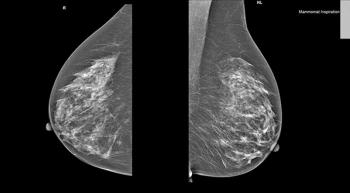
Based on data from the DESTINY-Breast04 trial, the FDA has granted a priority review designation for the supplemental biologics license application for fam-trastuzumab deruxtecan-nxki.

Brittany Lovely is a managing editor for the OncologyLive® print publication and editor of the Miami Breast Cancer Conference® and Chemotherapy Foundation Symposium® dailies. Email: blovely@mjhassoc.com

Based on data from the DESTINY-Breast04 trial, the FDA has granted a priority review designation for the supplemental biologics license application for fam-trastuzumab deruxtecan-nxki.

Patients with breast cancer who experience adjuvant hormone therapy (AHT)-related hot flashes and are treated for hot flashes at the beginning of therapy had worse outcomes than those who did not.

Data from the phase 2 MOUNTAINEER trial showed durable responses with tucatinib plus trastuzumab for patients with previously treated metastatic HER2-positive colorectal cancer.

Engagement with patient-reported outcome assessments, digital education tools, and patient portal information highlighted disparities in care according to data from community practices.

Nurse navigators may play a key role in mitigating toxicities from chemotherapy and perform geriatric assessments for patients treated at hematology/oncology clinics.

Updated data from the phase 3 BELIEVE trial revealed a sustained reduction in the need for red blood cell transfusions among patients with β-thalassemia who received treatment with luspatercept-aamt.

Heavily pretreated pediatric and young adult patients with relapsed or refractory B-cell acute lymphoblastic leukemia maintained response with tisagenlecelucel according to long-term follow-up data from the phase 2 ELIANA trial.

At data cutoff, all treated patients in a phase 2 trial experienced a clinical complete response with single-agent dostarlimab-gxly.

Sacituzumab govitecan elicited a statistically significant and clinically meaningful benefit among patients with hormone receptor–positive, HER2-negative metastatic breast cancer.

Pilot programs based out of Yale Cancer Center and Moffitt Cancer Center seek to improve access for newly diagnosed patients with cancer.

Sacituzumab govitecan-hziy significantly improved progression-free survival in patients with HER2-low expressing TNBC and HER2-negative disease.

Patients with HER2-positive breast cancer who also have brain metastases experienced clinical benefit with fam-trastuzumab deruxtecan-nxki in the phase 2 TUEXEDO-trial.

Investigators are seeking to overcome barriers to help patients with acute myeloid leukemia achieve complete and durable remissions by focusing their attention on novel agents engineered to target adhesion factors.

Identifying targets early can help forestall resistance and improve the efficacy of osimertinib, a EGFR tyrosine kinase inhibitor, in the first-line setting.

A combination of encorafenib (Braftovi), binimetinib (Mektovi), and cetuximab (Erbitux) in the first-line setting was tested for efficacy in patients with BRAF V600E–mutant CRC.

In order to achieve health equity for patients with cancer, physicians must first understand the root cause of heath disparities, many of which may be invisible. Broadening conversations about health and equity, drawing attention to gaps in care, and prompting urgency on the issues that influence health care are crucial first steps to turn conversation into action.

Patients with breast cancer who harbor multiple PIK3A-mutant tumors achieved a higher clinical benefit from PI3Kα inhibition compared with single mutant tumors according to response analysis data from the SANDPIPER trial.

Low-intensity surveillance may be comparable to high-intensity surveillance for cancer control in patients with high-risk non-muscle invasive bladder cancer (NMIBC).

The future looks to be defined by essential clinical trials.

Broader clinical trial criteria could nearly double the number of patients with advanced non-small cell lung cancer who are eligible to participate.